#l.h
Text
why is hamilton so bitchy 😭 still luv him though
#have you seen those eyes#dayum#very yummy#proud lewis hamilton simp#lewis hamilton f1#lewis hamilton#L.H#formula one#f1#formula1#24 season#2024 f1 season#chinese grand prix#china gp 2024#shanghai gp 2024#china grand prix 2024 season#bitchys#so pookie#so babygirl#look at him
3 notes
·
View notes
Text
can confirm, after a total of 10 hours on the road this weekend (so i really had time to think about this), that:
heeseung's the type of guy to pull over and make you suck his dick with the windows down, jay's the type of guy to keep his hand on your thigh to tease you along the way until you get to your rest stop where he can shove you into the bathroom stall and fuck you, jake would just let you suck him off while he's driving (until he needs to pull over cuz he can't help himself), and sunghoon would give you a pair of vibrating panties on the lowest setting to keep you wet until he can rip them off the second the door closes at your hotel room
#౨ৎ 𓈒 ﹒ 🍒 sol's thoughts#enhypen hard hours#enhypen smut#heeseung hard hours#jay hard hours#jake hard hours#sunghoon hard hours#heeseung hard thoughts#jay hard thoughts#jake hard thoughts#sunghoon hard thoughts#enhypen hard thoughts#l.hs#p.js#s.jy#p.sh
319 notes
·
View notes
Photo
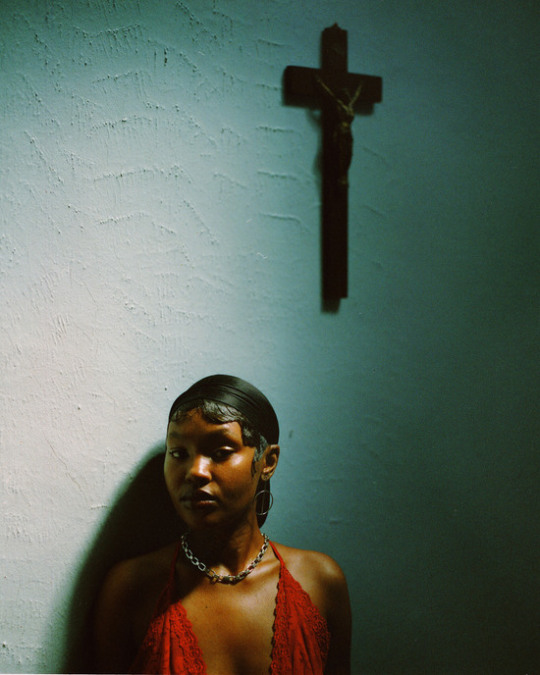

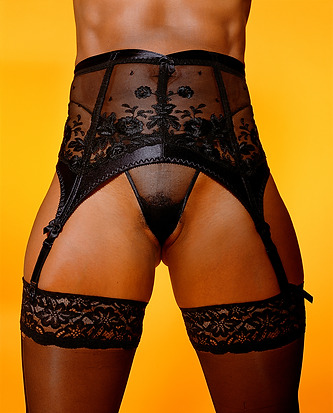

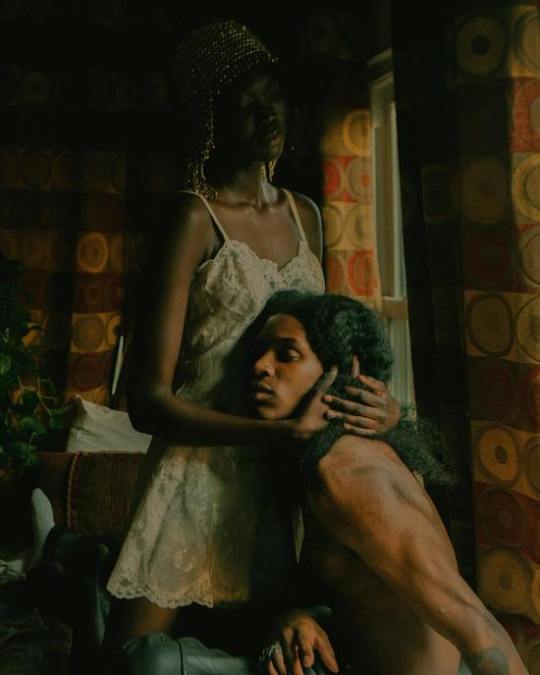
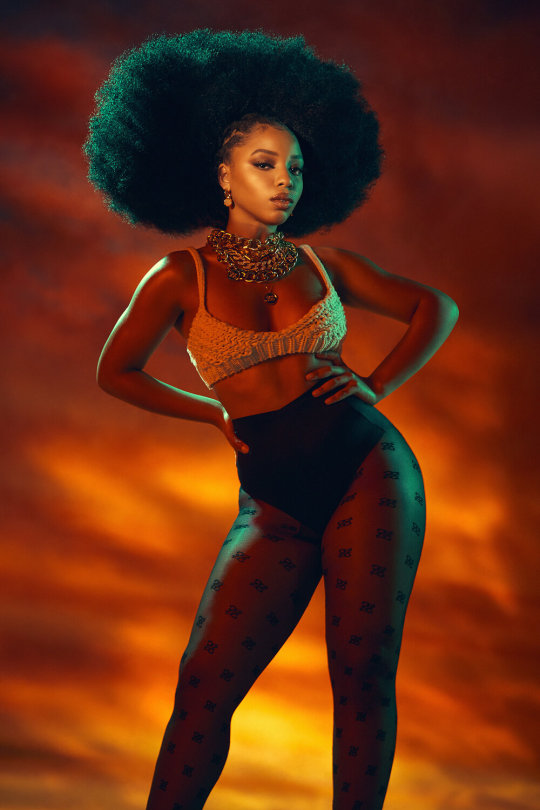
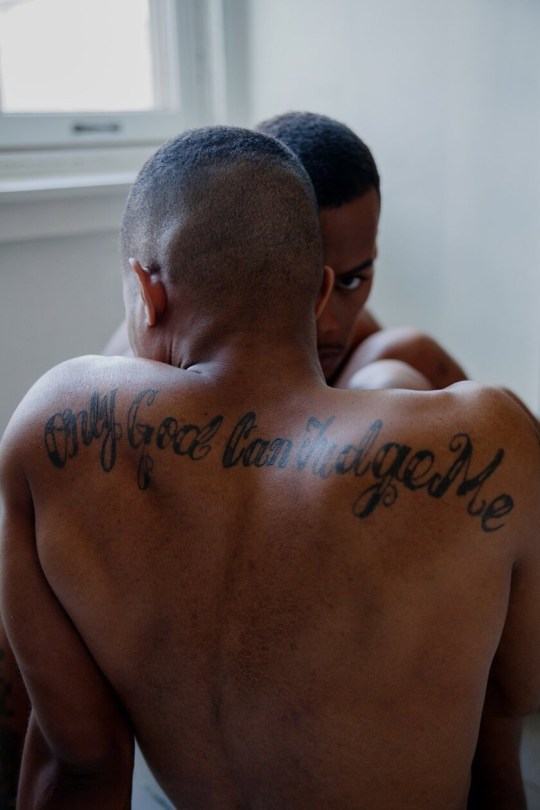

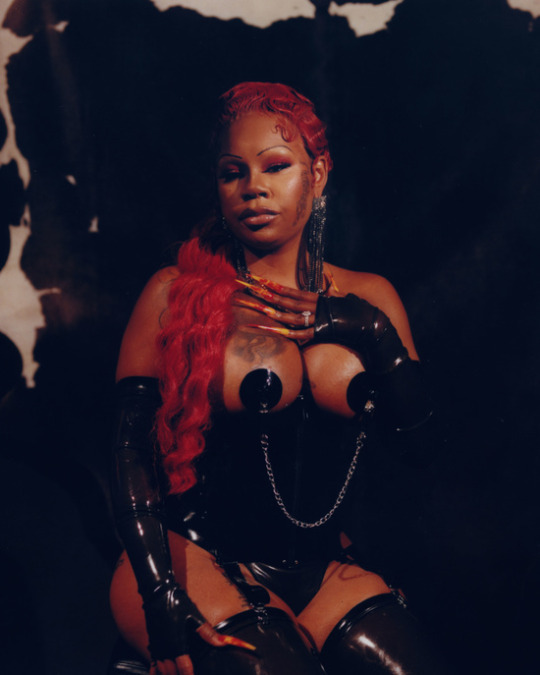
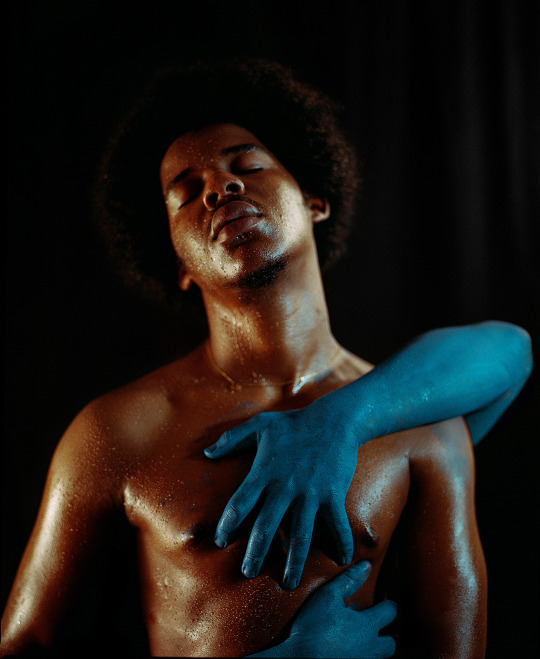
Himes suggests that for complete racial liberation and sexual freedom to happen, black women must do more than throw off respectable dress (that is, get rid of respectability) or work away from racial scripts. Black and white men have to bottom themselves out as well. Everyone has to get on the one.
from Funk The Erotic by L.H Stallings
from top left to bottom right: Kennedi Carter, Deana Lawson, Renée Cox, Shikeith, Kennedi Carter, Chrisean Rose,Shikeith, Erik Carter, Kennedi Carter, Shikeith
222 notes
·
View notes
Text
Return of the Queen 👑🐖
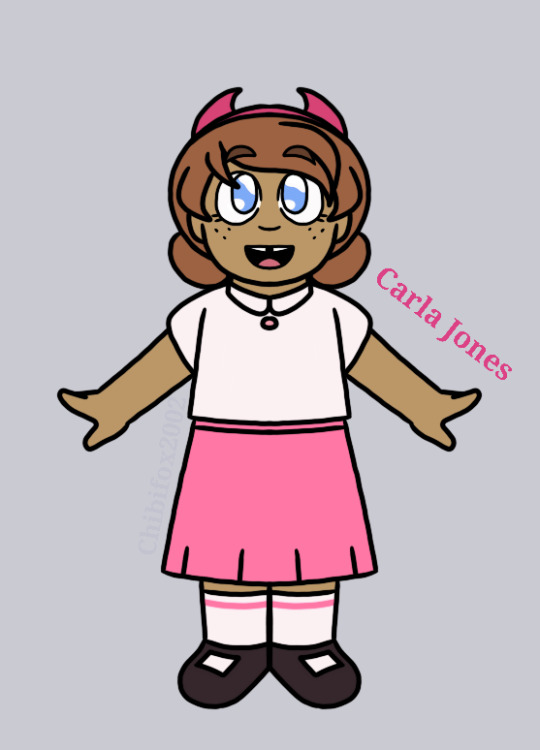
(Carla and her family are getting a HEAVY redesign! I've figured that since they were supposed to be a mixed family I should actually use the fact that I now know proper skin tones to good use! Also, they've all been needing a redesign after all these years!)
(( I'll be reblogging this w/ the rest of the Jones family once they're complete))
#Carla Jones#my character(s)#my art#little helper au#batim#batim au#batim oc#it's so weird using the L.H tag again
14 notes
·
View notes
Text
lewis on the floor is something that can be so personal
140 notes
·
View notes
Text
haute couture - preview
:・゚。➷❞ "a good preview makes you want to read the whole book"
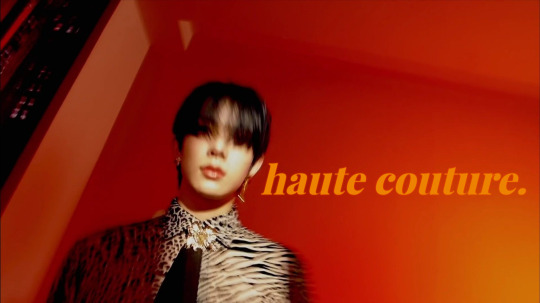
PAIRING ceo! l.hs x fem! reader
SYNOPSIS you always dreamed of being a fashion designer but becoming one is harder than you thought. So when the ceo of a well-known fashion label searches for new designers, you take your chance and try it. However, things go not as planned
GENRE ceo au. fashion au. series.
WARNINGS heeseung is an asshole. insults.
WORD COUNT 470

You slowly approached the counter, the blonde receptionist, you threw a small inconspicuous look at her name tag, soi lorei looked at you up and down. You couldn't quite interpret her look she was giving you, but you knew that it wasn't friendly at all. After giving you a disapproving look, she began asking you condescendingly, "What do you want?"
"Uhm," you cleared your throat, "I'm here for the job interview with Mr. Lee," you replied with a shy smile only to be met with a sneering laugh. "Well good luck then," said soi lorei ironically, “third floor, last door. Don't forget to knock first."
After an "eternity", or at least it felt like an eternity, the elevator doors opened, and you were more than happy to get out of the cramped space. You let your gaze wander down the long hallway. Glass doors separated the large conference rooms from the hallway.
Third floor, last door, you repeated the receptionist's words in your head as you walked in the direction of said door.
“You must be ln yn, right? I'm Park Chaewon, Mr. Lee's secretary. He's already expecting you,” she greeted you and nodded her head towards the door.
You thanked her and started knocking on the big door until you heard a quiet come in.
Now that you saw him, you couldn't believe the rumors that were being told about him. People said he was a mean man who would fire anyone who didn't immediately do what he was told. However, said man looked friendly in front of you, but you would soon find out that the rumors about him being mean weren't wrong.
You took a closer look at him. He looked very young, maybe only a few years older than you, his raven hair neatly styled but still catching his eye. The way he was sitting in his black chair just screamed out how much power this man had.
Finally, he rose from his chair to offer his hand to greet you. You hesitantly put your hand in his and immediately wanted to withdraw it because the man's handshake was damn firm.
So far the interview was going pretty well, at least that's what you thought.
However, if you asked him, you weren't really different from the others, just as boring and just as eager to achieve your dream.
And everything got worse for him when you showed him your portfolio of designs. Boring, uncreative, just like everyone else's, ugly, all these adjectives swam through his mind as he looked at your ideas and judged them.
You could see in the man's face that something was wrong too, but the next words he said really hit you and hurt you so much that you could hardly breathe, and the world started spinning in front of your eyes.

TAGLIST open
#🪡- haute couture. l.hs#ficscafe#enhypennetwork#enhypen heeseung#lee heeseung#heeseung#heeseung x reader#enhypen#x yn#x reader#ceo au#fashion#haute couture
50 notes
·
View notes
Text
I was born impatient
And I was born unkind
But I refuse to believe
I have to be the same person I was born
When I die
#Lem#my theme song#for l.j.#for l.h.#for a lot of people#musik#cocaine and abel - amigo the devil#Spotify
3 notes
·
View notes
Text
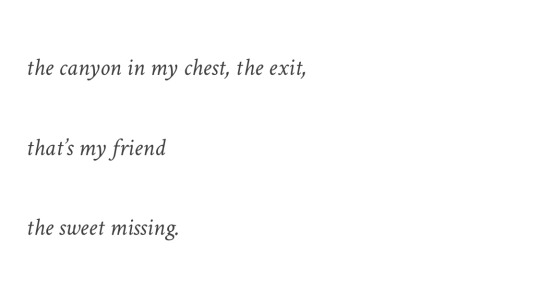
Mitchell L. H. Douglas, "It is Tuesday, & My Student Leaves Class"
5 notes
·
View notes
Text
i wish I could turn back time and make the right decision
2 notes
·
View notes
Text
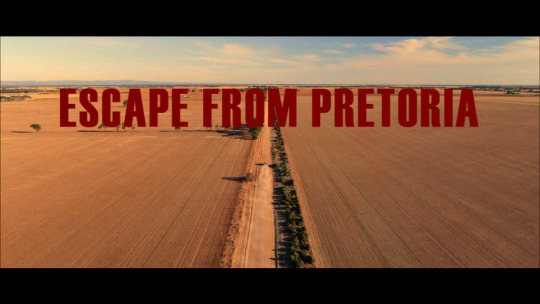

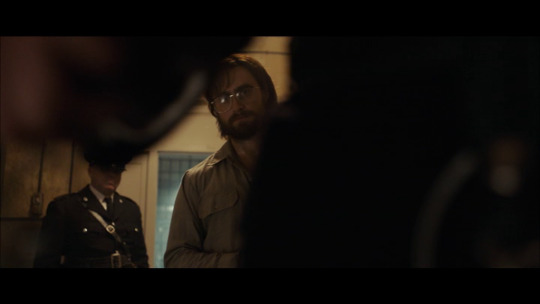

youtube
Escape from Pretoria (2020)
My rating:6/10
Pretty solid prison escape movie, with much planning and making of Devices and sneaking around, plus the guards are actual fascists, so that makes the eventual escape (and subsequent humiliation of said guards) all the sweeter.
#Escape from Pretoria#Francis Annan#L.H. Adams#Tim Jenkin#Daniel Radcliffe#Daniel Webber#Ian Hart#Youtube
2 notes
·
View notes
Photo
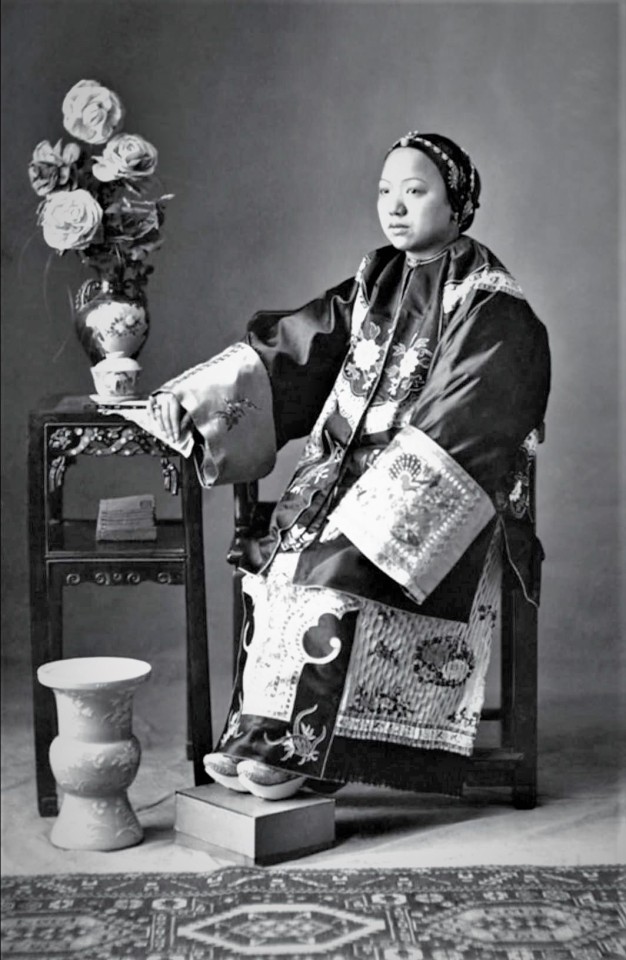
Portrait of a lady in San Francisco, no date. Photographer unknown (but based on the configuration of the floor vase, possibly William Shew’s studio).
Images of Chinese Pioneer Women on the Urban Frontier
Chinese American women have a rich and complex history that spans more than 170 years. From the mid-19th to the early 20th century, Chinese American women faced many challenges and obstacles as they worked to establish themselves in the United States.
Although few in number, women were among the first wave of Chinese arriving in the United States during the latter half of the 19th century, largely during, and as a result of, the California Gold Rush. When the American ship Eagle arrived at San Francisco on February 2, 1848, two Chinese men and one woman supposedly accompanied a Charles V. Gillespie upon his disembarking. According to H.H. Bancroft in his History of California (San Francisco, 1890, Vol. 7, p. 336), the Chinese men left for the hills after the news of the discovery of gold, and the woman remained as a servant in the Gillespie household.

Portrait of a lady, no date. Photograph possibly by Lai Yong (from a private collection).
At this time, Chinese women were virtually absent from the American West, as they were barred from immigrating to the United States by discriminatory laws such as the Page Act of 1875 (Sect. 141, 18 Stat. 477, 3 March 1875). The law represented the first restrictive federal immigration law in the United States, which effectively prohibited the entry of Chinese women, marking the end of open borders. (Seven years later, the 1882 Chinese Exclusion Act would effectively ban immigration by Chinese men.) Named after its sponsor, Representative Horace F. Page, a Republican representing California who introduced it to “end the danger of cheap Chinese labor and immoral Chinese women,” the law technically barred immigrants considered “undesirable.” This included women who were believed to be prostitutes, as well as women who were considered to be morally loose or of questionable character.
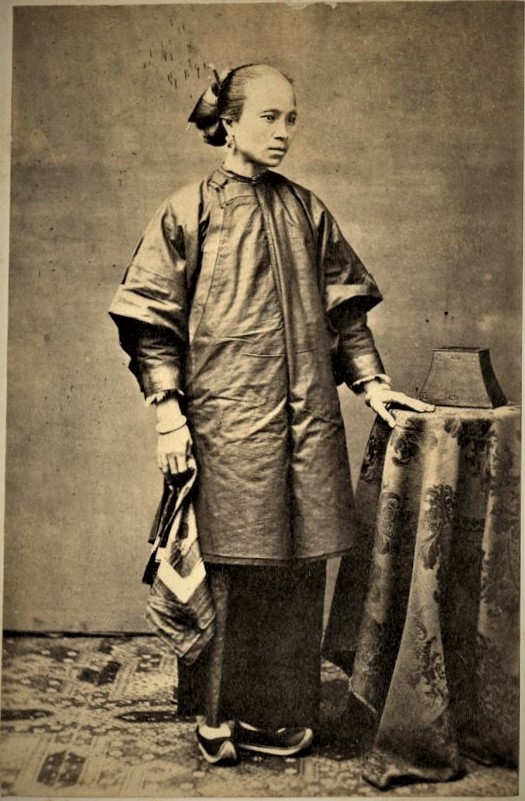
Portrait of a woman, c. 1870. Photographer unknown (from the collection of the California Historical Society).
Chinese women who sought entry to the US at San Francisco would be interrogated, and their faces compared with images produced by the then-growing photographic identification industry to serve the government’s need to screen and deny entry to immigrants.

William Shew’s Pioneer Gallery, young woman with fan, after 1880, albumen cabinet cards (from the collection of the California Historical Society).
According to historian Eithne Luibheid, Chinese women were subject to this method of identification prior to any other immigrant group because of the “threat of their sexuality to the United States.” Thus, Chinese women had to demonstrate that they grew up in respectable families and that their husbands could afford to support them in the United States. Immigration official considered a range of clues about an entrant’s character based on the appearance of the body and clothing in an effort to differentiate between bona fide wives and mothers from prostitutes. In contrast, men were not required to carry photographs or match photographs that had been sent in advance to San Francisco Port authorities.
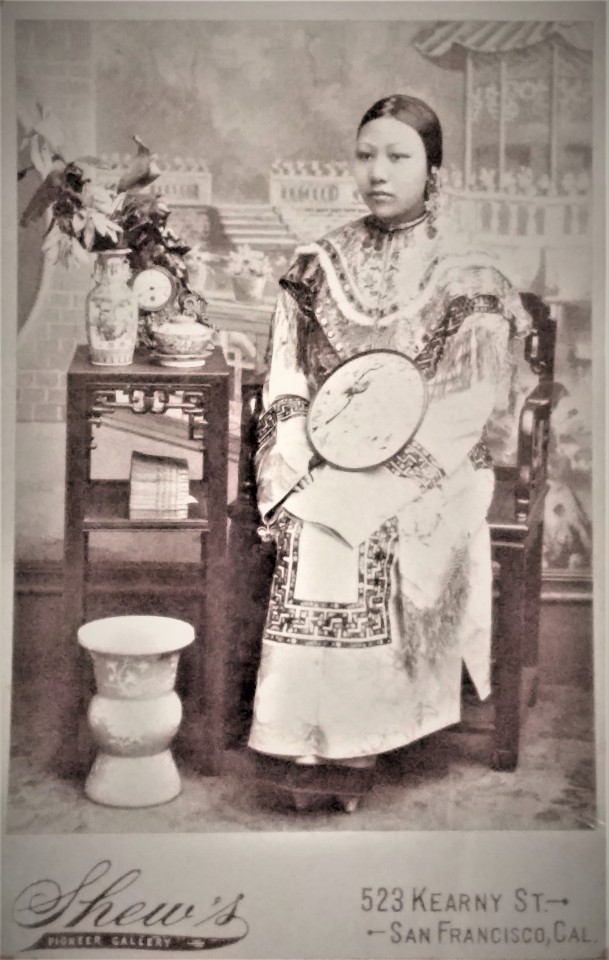
William Shew’s Pioneer Gallery, young woman with fan, c.1880, albumen cabinet cards, from the collection of the California Historical Society.
It would not be unreasonable to conclude that the challenge posed by the entry of Chinese immigrant women drove the deployment of photograph technology on a mass basis as a principal means by which the government sought through each stage of the examination process to ensure that unqualified women could not be substituted for women who were properly questioned at any point in time.
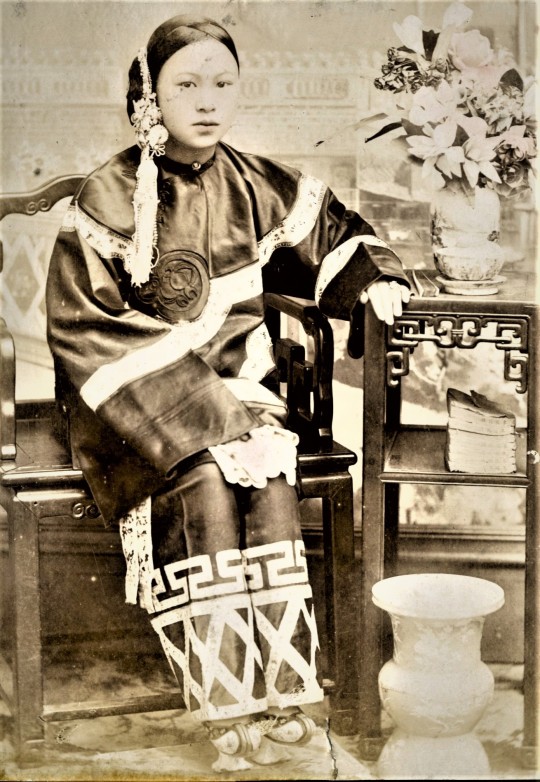

Portraits of two different women in the collection of the Stanford Manuscripts division of the Stanford University Libraries. Based on the pattern of the backdrop and the decorative furnishings, the two portraits above appear to have been taken in the Shew’s studio near Chinatown at 523 Kearny Street in San Francisco. Two centuries later, the pair of Stanford photos prompts speculation why the women in both photos wear identical outfits. The coincidence raises the question about whether the women were related, or if the studio provided the garment for its customers to help them prove their bona fides as daughters or wives of a merchant and, thus, eligible to stay in the US.
The Page Act had a profound effect on Chinese American women, as it was used to justify the exclusion of Chinese women from the United States. Many Chinese women were denied entry on the grounds that they were suspected of being prostitutes, despite having no evidence to support these claims. The 1875 law represented the opening shot in a larger legislative war against Chinese Americans, which included discriminatory laws such as the Chinese Exclusion Act of 1882. These laws contributed to a hostile environment for Chinese Americans, and made it difficult for Chinese women to establish themselves in the United States.

Portrait of a 19th century Chinese woman, no date. Photographer unknown (from a private collection). Based on the pattern of the backdrop, the photograph was probably taken at the studio of either Chin K. Toy of 824 Clay St. or L.H. Sun of 827-1/2 Washington Street.
The few Chinese women who did come to the United States often faced extreme poverty and discrimination. Women who lacked the financial security of merchant spouses worked as members of the laboring class, toiling long hours like their husbands. In the late 1870s, a few could be found as domestics or in intensive labor industries as seamstresses, washerwomen, shirtmakers, gardeners, and fisherwomen.
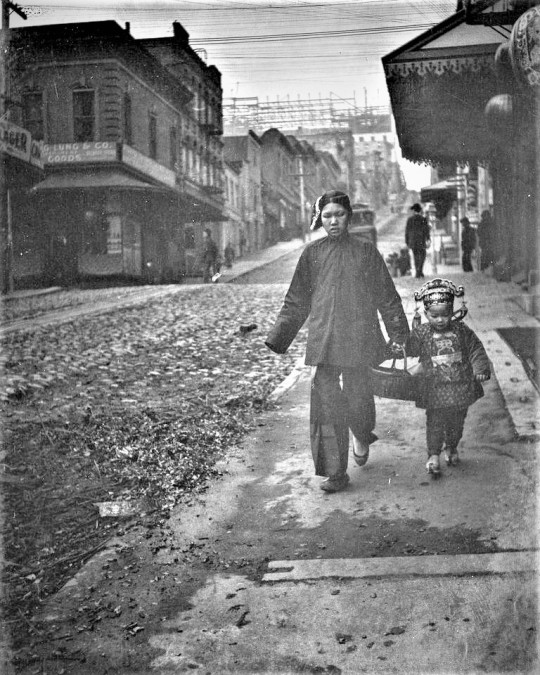
“Carrying New Year Presents” c. 1900-1905. Photograph by Arnold Genthe (from the Genthe photograph collection, Library of Congress, Prints and Photographs Division). The young woman in the photo appears to have been a servant to the family of prominent merchant Lew Kan. The boy in the photo is Lew Bing Yuen, the older son, who also appears in Genthe’s well-known photo “Children of the High Class.” The woman’s plain dress (in contrast to the boy’s seasonal garb), shows clearly that she was not the boy’s mother or sister. The pair is walking east on Sacramento Street from its intersection with Dupont Street.
The servant seen in the above photo – nanny or otherwise – could very well be characterized as a mui tsai (妹仔; canto: “mui jai”). The “little sister” were essentially young Chinese women who worked as domestic servants in China, in virtual slavery to affluent households or brothels. The young women were typically drawn from poor families and sold at young ages to merchant families during this period. This form of charitable adoption continued on the condition that they would be freed through marriage. The system spread to Hong Kong, Southeast Asia, and to the US. The practice didn’t disappear with the Republic’s founding, and the rescue of such women was the objective of Protestant reformers, notably in San Francisco. Mui jai would start to disappear only after the establishment of effective 2nd and 3rd generation families in the US later in the 20th century.
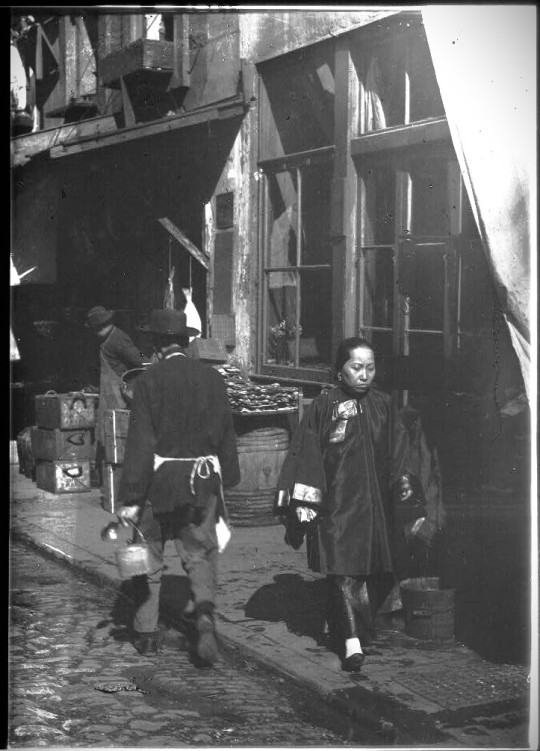
“A Woman House Servant” c. 1896 - 1906. c. 1900-1905. Photograph by Arnold Genthe (from the Genthe photograph collection, Library of Congress, Prints and Photographs Division). Based on her plain attire and walking unaccompanied on a Chinatown street, historian Jack Tchen has suggested that the woman served as a domestic servant for one of the neighborhood’s wealthier families.

“An Afternoon Airing” c. 1900-1905. Photograph by Arnold Genthe (from the Genthe photograph collection, Library of Congress, Prints and Photographs Division). The little girl is dressed in New Year’s festive clothing, and she is walking on Dupont Street with her amah. As historian Jack Tchen observes about this photo, the girl’s parents were wealthy enough to employ a domestic servant.
In family-run operations, like laundries or grocery stores, the line between business owner and laborer blurred, and wives were often compelled to work alongside their husbands to keep their businesses afloat.

“Picture Bride Yook Gee” c. 1898. Photographer unknown (from the collection of the San Francisco Public Library).
“And what of those Chinese women who came to America as wives?” asked historian Iris Chang wrote in her book, The Chinese in America. “In China, society mandated that a married woman’s life centered on the family, serving them from cradle to grave. According to one school of ancient Chinese philosophy, the “Three Obediences” dictated that she first obey her father, then her husband after marriage, and finally her eldest son when widowed.”
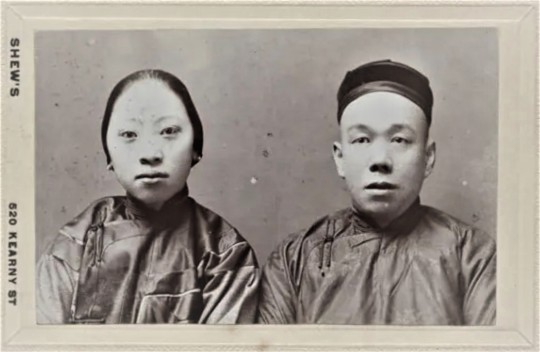
A portrait of a merchant and his wife, no date. Photograph by Shew’s studio (from a private collection). The joint portrait likely served as proof of the woman’s status as a merchant’s spouse and to avoid the restrictions imposed by the Page Act of 1875 which limited the entry of Chinese women to the US so severely that Chinese were effectively precluded from establishing families.
Chang on merchant spouses:
“Because the average worker could not afford to support a family in the United States, most Chinese women emigrants who were not prostitutes were wives of merchants. Most had grown up in modest but respectable families in small villages near Canton. They tended to be middle-class, because upper-class families would not allow their daughters to marry outside China, and because many Chinese merchants in the United States considered working-class women beneath them. . . .
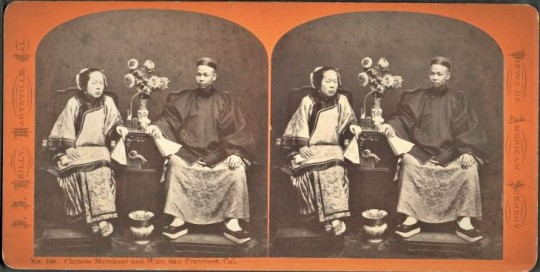
“No. 108. Chinese Merchant and Wife, San Francisco, Cal.” c. 1875. Photograph by John James Reilly (from the collections of the Oakland Museum of California and the New York Public Library).
“Having been raised in a protected, insular household, the typical merchant’s wife had never ventured far beyond her village until journeying to the United States. Even more problematic was the fact that the middle and upper classes in China practiced the nine-hundred-year-old tradition of bandaging a young girl’s toes under the ball of her foot, reducing the foot to a length of five or even three inches. Reflecting the same impulse as the Western fashion of warping the female ribcage with corsets, foot-binding existed primarily to symbolize a family’s wealth and power, advertising its ability to support a nonworking, purely ornamental human being.
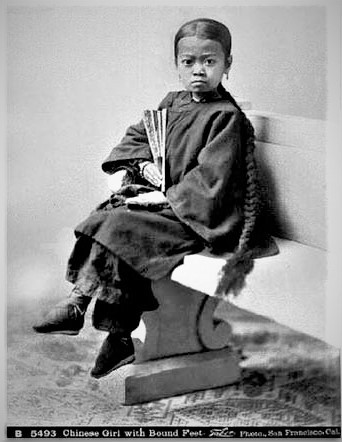
“B 5493 Chinese Girl with Bound Feet” c. 1880. Photograph by Isaiah West Taber (from the collection of the Bancroft Library).
“For many of the wives, home in the United States was nothing more than a gilded prison, where they were jealously guarded as treasured possessions. Some Chinese immigrant women could easily count the number of times in their lives they had ever stepped outdoors. “My father traveled all over the world,” one Chinese American remembered, “but his wife could not go into the street by herself.” Only during holidays were some permitted to venture out, accompanied by a chaperone. . . .”
“No doubt many Chinese men felt they had good reason to keep their wives under lock and key. The scarcity of women in the West and the violence of frontier society posed a very real danger of kidnapping or molestation in the streets. A bound-foot woman could neither run from assailants nor fend off attacks. Indeed, with several toes rotted away from foot-binding, she could hardly walk—or even remain standing—for an extended period of time. The annals of nineteenth-century California recount many stories of helpless Chinese women being thrown down into the mud, dragged by the hair, pelted with stones, their clothes and earrings yanked off.
“So perhaps staying indoors was safer, though less than stimulating. One wife whiled away the hours playing cards with her servant, looking after her son, gossiping with neighbors, or hiring a hairdresser or a female storyteller to entertain her. . . .”
The photographic record, however, suggests that Chang may have overstated the limitations on movement by the women of Chinatown at least toward the end of the 19th century.
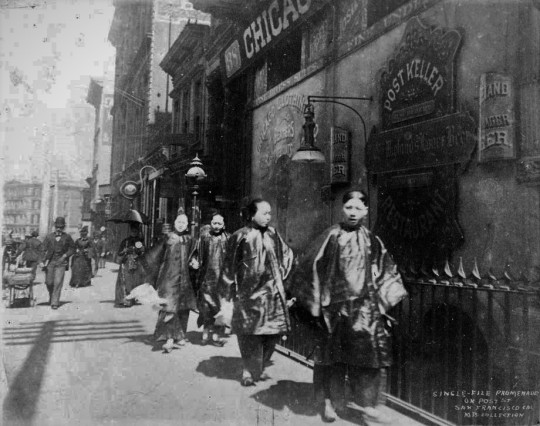
“Single-file Promenade on Post St. San Francisco Cal” c. 1890. Photograph by A.J. McDonald (from the Marilyn Blaisdell collection).
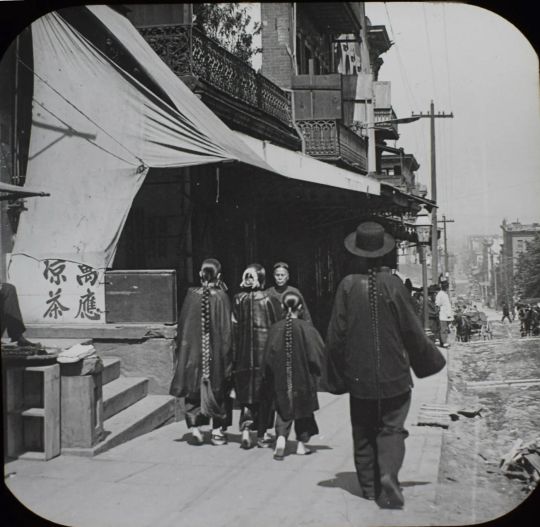
“Going to the Matinee, Chinatown” c. 1889. Photograph by A.J. McDonald (from the Jesse B. Cook collection of the Bancroft Library). In this striking photo showing the hairstyles of Chinese American women of the time, a trio of women are shown walking east on Washington Street (from Stockton Street) and down the slight hill. The women with the longer braids are unmarried (as was the fashion of the time), and probably daughters following their mother. McDonald’s title of the photo, and the known locations of Chinese opera venues on this block provide context for the trio’s walking this particular street during the day; they are either headed to the Royal Theatre at 836 Washington Street or the Grand Theatre at 814 Washington toward the eastern end of the block.

Three women walking on Kearny Street on the outskirts of San Francisco Chinatown, c. 1896-1906. Photograph by Arnold Genthe (from the Arnold Genthe collection at the Library of Congress).
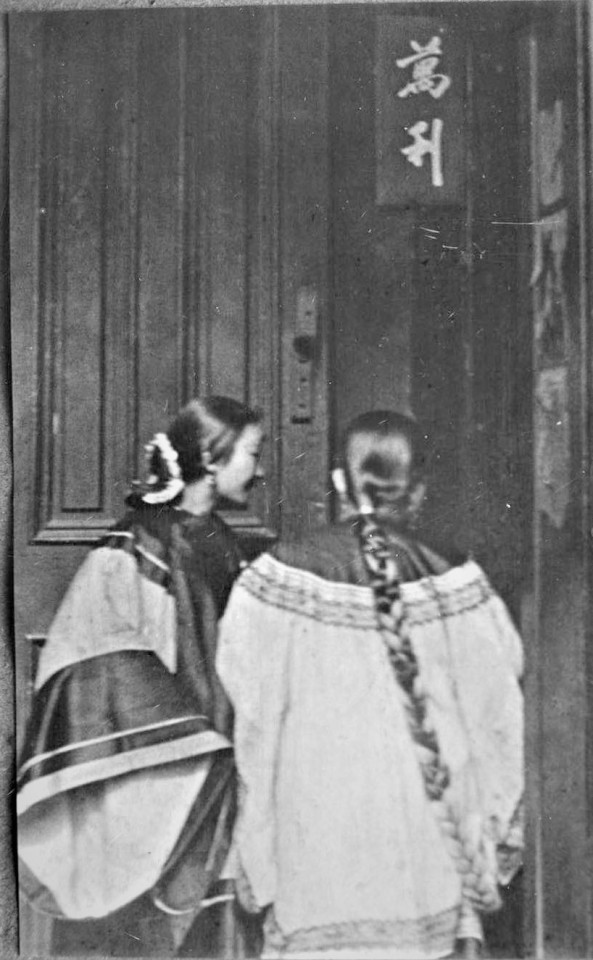
“Dressed for the Feast,” c. 1896-1906. Photograph by Arnold Genthe (from the collection of the Library of Congress). For this photo taken at 814 Washington Street, historian Jack Tchen wrote as follows: “The single braid of the woman on the right indicates that she is not married. Interwoven with the hair is raw silk to extend the length of the queue. In contrast to the men, women did not shave their foreheads. Once every seven years the ‘Good Lady Festival’ was celebrated in Tangrenbu, during which all the women in the quarter were accorded the same rights as men and allowed to walk the streets freely.”
In her essay “The Chinese Woman in America,” Edith Maud Eaton, a Eurasian writer who used the pen name Sui Sin Far, offered a glimpse of merchant women’s lives:
“Now and then the women visit one another. They laugh at the most commonplace remark and scream at the smallest trifle, they examine one another’s dresses and hair, talk about their husbands, their babies, their food, squabble over little matters and make up again, they dine on bowls of rice, minced chicken, bamboo shoots and a dessert of candied fruits. In contrast, other Chinese wives did not enjoy the luxury of idleness.”

“Golden Gate Park. 1890s.” Photographer unknown (from the collection of the Bancroft Library). As the above photo of a family in Golden Gate Park attests, San Francisco’s first Chinese residents also enjoyed the park. However, such daytime leisurely pursuits, which presumably included transportation to the western half of the city either by horse-drawn cart or cable car, would have been the privilege of a merchant’s household during the 19th century. The Bancroft collection’s striking photo captured not only a very rare instance of a Chinese family in the park but also the social standing of a fan-carrying, male head of household; he appears to have been accompanied by a young wife, his mother, and either a maid or an aunt of the three children shown in the photo.
As Chang writes further:
“Difficult as her life could be, the typical Chinese wife had more power in the United States than she could have achieved in her home village. First and most important, she had escaped the tyranny of her mother-in-law. In China, a daughter-in-law lived with her husband’s family and endured her husband’s mother’s hazing until she gave birth to a son; bearing a male child validated her existence and earned her the respect of the family. Her power grew with each additional male child and climaxed when she became a mother-in-law herself, attaining the authority to perpetuate the tradition by bullying her sons’ wives.”
Despite these challenges, Chinese American women formed close-knit communities and found ways to support each other. They played important roles in the development of early Chinese American society, providing care for families, organizing social events, and raising funds for community causes.

“No. 142. Chinese Woman and Child. San Francisco, Cal.” c. 1870-1889. Photograph probably by John James Reilly (from the collection of the Bancroft Library). This studio stereograph of a Chinese mother and child represents more than venerating the relationship of mother and child, or even the mere striving for respectability by Chinese America’s merchant class. Such photographs conferred on pioneer Chinese American women and mothers often crucial legal advantage in the US immigration process.
Chang:
“Perhaps most significantly, the Chinese emigrant wives also mothered a tiny population of American children. In 1876, the Chinese Six Companies estimated that a few hundred Chinese families lived in America, and perhaps one thousand Chinese children. In the long run, these infants, the first generation born in America, would enjoy more rights and privileges in the United States than their immigrant parents. Most were too young then to know that heated racial discussions were under way in Congress and across the country, negotiations about civil rights that would profoundly affect their future.”
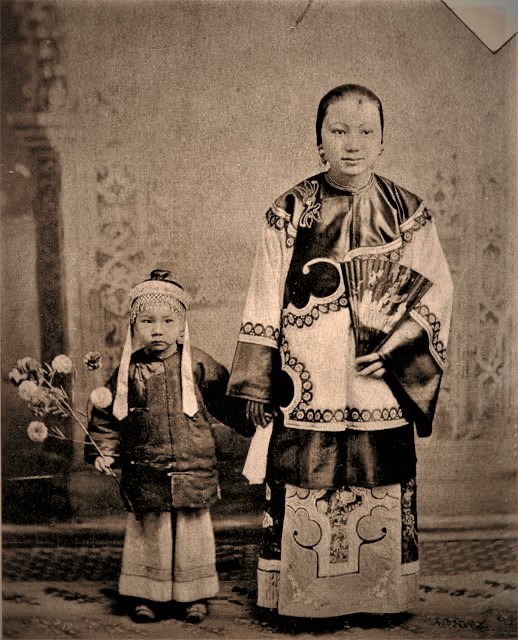
Mother and child, San Francisco CA, no date. Photographer unknown.
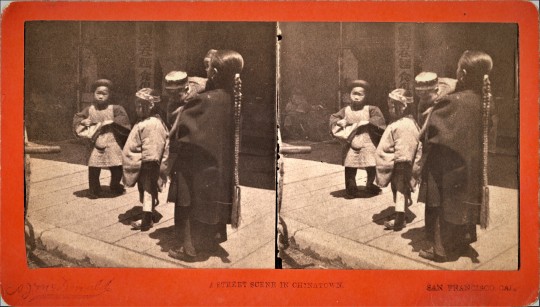
“A Street Scene in Chinatown. San Francisco, Cal.” c. 1881. Photograph by A.J. McDonald (from a private collection).

Mother and child, San Francisco CA, c. 1880. Photograph by William Shew (from a private collection).
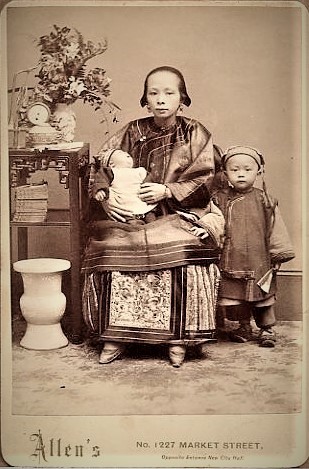
Chinese mother and two children, c. 1880. Photograph by Allen’s (apparently using props identical to those seen in Shew’s studio portrait) from a private collection.
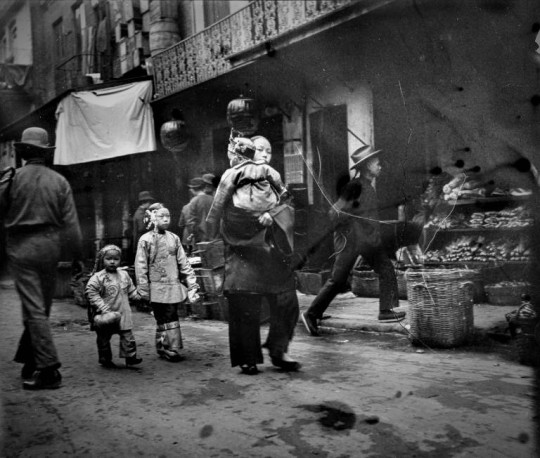
“Woman and children walking down a street, Chinatown, San Francisco,” c. 1896-1906. Photograph by Arnold Genthe (from the Genthe photograph collection, Library of Congress, Prints and Photographs Division).
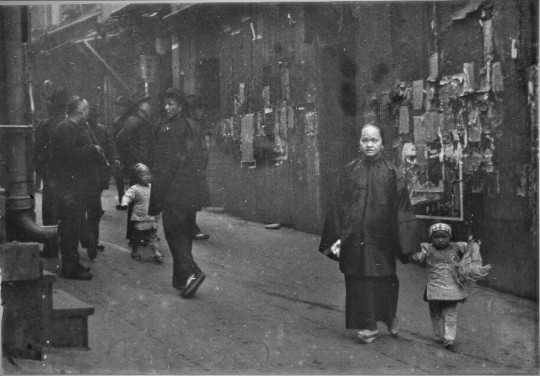
“Woman walking down a street with a child,” c. 1896-1906. Photograph by Arnold Genthe (from the Genthe photograph collection, Library of Congress, Prints and Photographs Division).
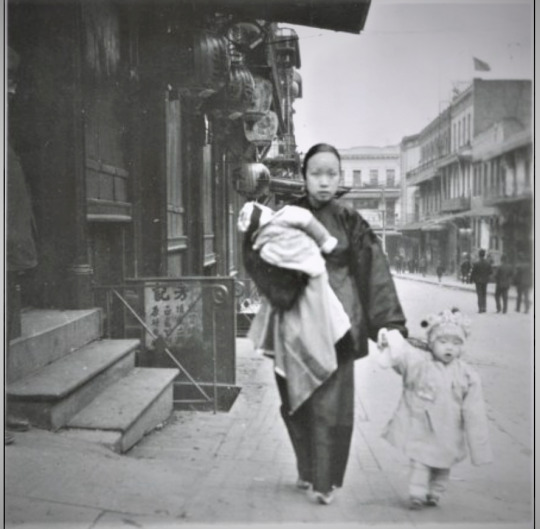
A mother and two children walking south along Waverly Place in old San Francisco Chinatown at the northwest corner of the intersection with Clay Street, c. 1900. Photographer unknown (courtesy of the National Archives; photo also in the collection of the California Historical Society). The elaborate headdress worn by the daughter at right indicates that the photo was probably taken during the New Year holidays.
Iris Chang's book, The Chinese in America: A Narrative History, provides a detailed account of the lives of Chinese women prostitutes in the 19th century. According to Chang, many Chinese women were forced into prostitution due to poverty, lack of opportunities, and gender inequality. These women were often sold or kidnapped and transported to the United States, where they were forced to work in brothels and other sex establishments.

Portrait of a simply dressed, unadorned girl, c. 1860s – 1890s. Photograph by E.W. Baker (from the Cooper Chow collection at the Chinese Historical Society of America). This image represents an unusual departure from the formal portraiture made to show well-being and status of Chinese women, especially merchant spouses or daughters. According to CHSA archivist Palma You, “the lack of shoes, plain clothing and hair, straightforward gaze and stance, and lack of props imply she may have been photographed to show ownership or perhaps to provide information for a future sale as a servant, slave, prostitute, or a mui tsai, known as "domestic slave girl.”
“The mui tsai, from Cantonese meaning little sister [妹仔; Canto: mūi jái] , was a cultural carryover from China;” wrote CHSA archivist Palma You. “[T]he system was generally regarded as a form of charity for impoverished girls. Under the system, poor parents sold a young daughter into domestic service, usually stipulating in a deed of sale that she be freed through marriage when she turned eighteen. Girls sold to rich and benevolent owners supposedly benefitted from the system. Well fed, clothed, and sheltered, they were known to establish long-lasting affectionate relationships with their mistresses. In contrast, Chinese girls kidnapped, lured, or purchased from poor parents and trafficked into California were considered chattel, without family, language skills, or the ability to negotiate in a foreign land, would ‘become household slaves, or, more probably, prostitutes for the rest of their lives.’ (Wu, 2001).
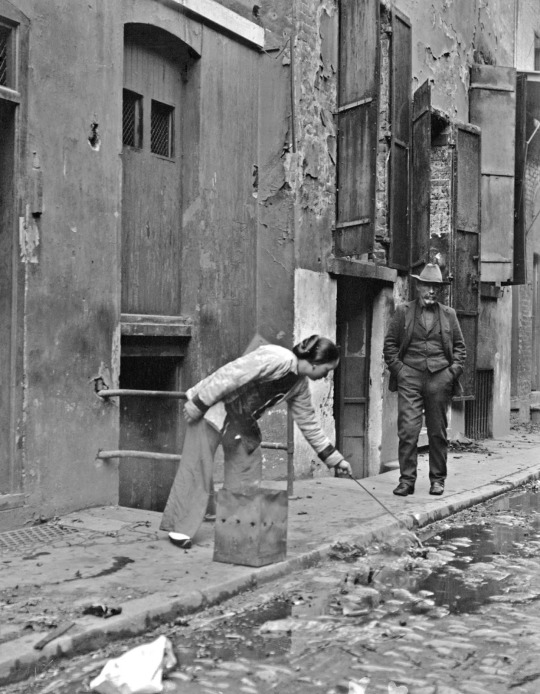
“The Street of the Slave Girls,” c. 1900-1905. Photograph by Arnold Genthe (Genthe photograph collection, Library of Congress, Prints and Photographs Division). “This woman is burning special prayer papers in the square incinerator can,” wrote historian Jack Tchen. “This is the Buddhist ritual practiced twice a month, at half-moon and full moon. Genthe entitled this photograph ‘The Street of the Slave Girls.’ Although there was no street by that name in English or Chinese, the highest concentrations of Chinese prostitutes were on Bartlett Alley and Baker’s (or Sullivan’s) Alley. The woman shown in this photograph is wearing very plain work clothes, and it is difficult to say if she was a prostitute or housewife.”
As Palma You of the Chinese Historical Society of America writes:
“Chinese girls and women fell victim to a notorious system of slave trafficking, shrewdly devised by Chinese secret societies called ‘tongs,’ during the 1800s and early 1900s in San Francisco. Many San Francisco officials condoned—indeed, supported this slave trade... (Wu, 2001). Research shows some mui tsai were not perpetual victims and demonstrated great strength in the face of adversity as they strived to improve their own conditions and prospered as a madam. A few become wealthy supporting themselves in the business. The mui tsai system persisted until the first half of the 20th century. By the 1920s the system pretty much phased out.”
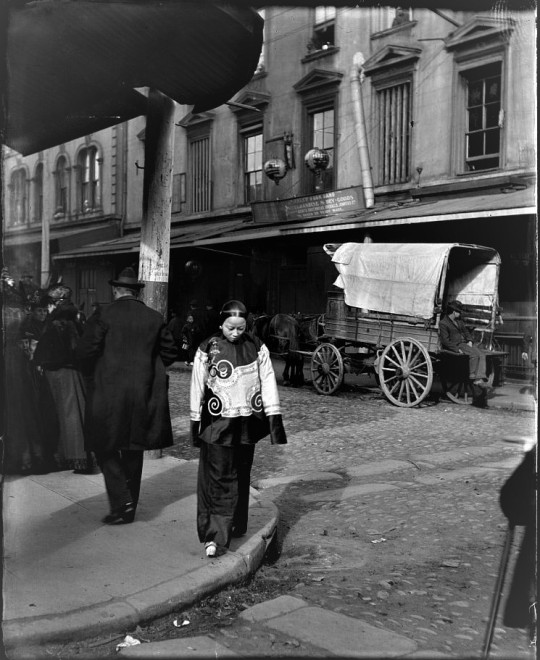
“Slave Girl in Holiday Attire,” c. 1900 -1905. Photograph by Arnold Genthe (Genthe photograph collection, Library of Congress, Prints and Photographs Division). This image was captured at the intersection of Dupont and Jackson streets. “The baroque-style Globe Hotel,” wrote historian Jack Tchen, “now occupied by Chinese, stood on the northwest corner, from which tours of Chinatown often started. Jackson Street was the red light district of Chinatown.” The term “slave girl,” Tchen asserted, “was used loosely to designate Chinese women sold on contracts. This woman is said to have been an especially beautiful and popular prostitute. It was fairly unusual for a woman to walk un-escorted in public.”
Chinese women prostitutes faced a range of challenges and dangers, including physical and sexual abuse, disease, and discrimination. They were also subjected to restrictive laws and regulations that further limited their freedom and autonomy.

Young woman walking with apparent escort(s), no date. Photographer unknown (from the Cooper Chow collection at the Chinese Historical Society of America). Research about this image is continuing, but the collector asserts that this rare image shows a slave girl probably walking on Dupont Street, accompanied by possibly two Chinese bodyguards and the non-Chinese man seen at the left of the photo.
“In the 19th and early 20th centuries, Jackson & Washington Streets were lined with ‘cribs,’ makeshift twelve-by-fifteen-foot stalls where the favors of Chinese girls could be purchased. The cribs were generally divided into two rooms by a curtain; through the inset barred window in the narrow door, the girls enticed men by displaying their upper bodies.”
-- From Dr. Weirde's Guide to Mysterious San Francisco.
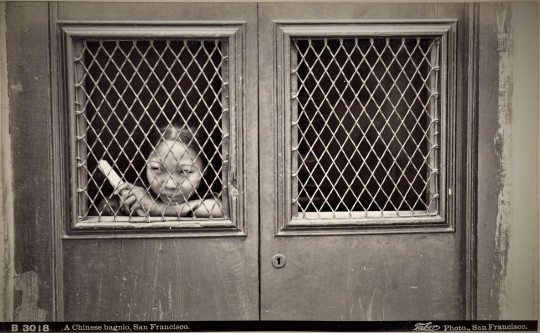
“B 3015 A Chinese bagnio, San Francisco” c. 1885-1888. Photograph by Isaiah West Taber (from the Martin Behrman collection and the collection of the Bancroft Library).
The experiences of Chinese women prostitutes were shaped by larger social and economic forces. The Page Act compounded the exclusions against Chinese immigration to the United States, and it perpetuated the marginalization and exclusion of Chinese women. The oppressive law (combined with anti-miscegenation laws), created a scarcity of women and, hence, drove the demand for, and growth of, the American sex industry to serve Chinatown’s bachelor societies in the American West.
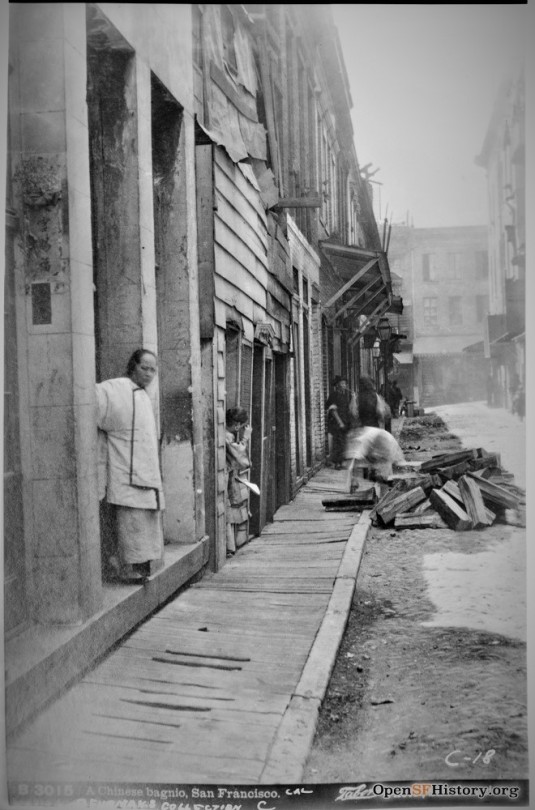
“B 3018 A Chinese Bagnio, San Francisco” c. 1885-1888. Photograph by Isaiah West Taber (from the Martin Behrman collection, courtesy of the Golden Gate NRA, Park Archives). Woman standing in doorway of alley. View south on an as yet unidentified alleyway. The number of the negative suggests that Taber took this photograph of the alleyway (Bartlett?) after the preceding photo depicting a woman behind the window screen.

“3722 Chinese Bagnio. Chinatown, S.F., Cal.” C. 1890. Photograph by Isaiah West Taber (from the Marilyn Blaisdell collection and the Bancroft Library).

Untitled, c. 1880s. Photographer unknown published by Schoene of San Francisco (from a private collection). The building facade appears adjacent to the frontage of the Chinese bagnio building photographed by I.W. Taber.
Despite obstacles, many Chinese women prostitutes were able to develop their own support networks and communities, often centered on their brothels and other sex establishments. The historical record is replete with examples of agency and resilience, as Chinese women often found ways to resist and challenge their oppressive conditions.
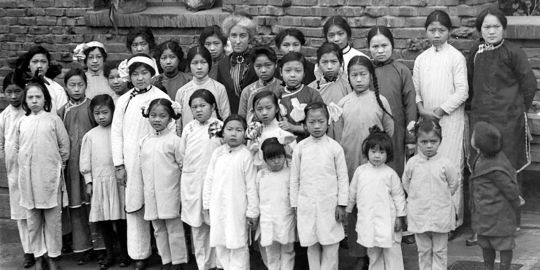
Tye Leung, second from left, back row, stands with a group of children and staff from the Presbyterian mission where she worked with Donaldina Cameron, center, a crusading anti-prostitution and anti-trafficking activist. Photo courtesy of the California History Room, California State Library, Sacramento, California. After marrying a white man in defiance of the state’s anti-miscegenation statute, Tye Leung Schulze she became the first Chinese American woman to work for the US federal government and an advocate for trafficked women, as well as the first to vote in the US when she cast a ballot in San Francisco on May 19, 1912.
As Chinese American communities grew and established themselves in cities across the United States, Chinese American women continued to face discrimination and prejudice. They were often paid less than their male counterparts, and were denied opportunities for education and advancement. However, they also worked tirelessly to improve their communities and secure a better future for their families. Despite the ongoing challenges they faced, Chinese American women remained resilient and determined. They continued to make significant contributions to American society, while making important strides in the face of extreme adversity.
Many Chinese American women formed women's organizations and worked to improve health care and educational opportunities for women and children. By the first quarter of the 20th century, they had established themselves as key participants in the lives of their communities, working to create a better future for themselves while creating first sizeable second generation of Chinese Americans.
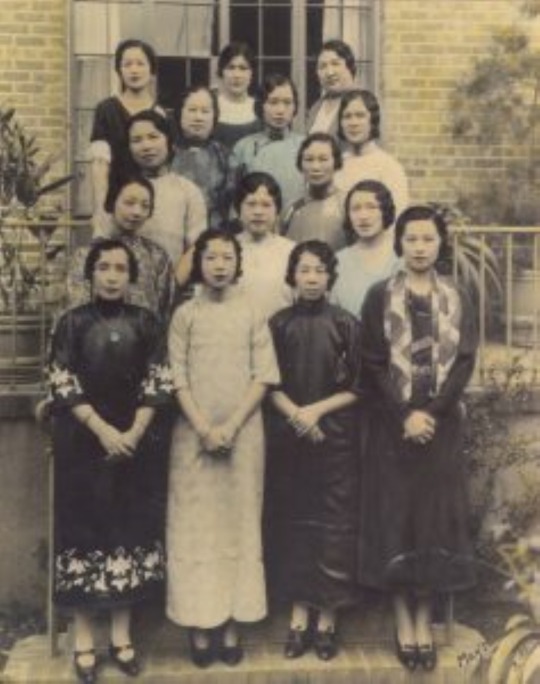
The board of directors of the Chinatown YWCA, c. 1930. Photographer unknown (from the collection of the Chinese Historical Society of America). To view a video by documentarian Felicia Lowe about the establishment of the Chinese YWCA go here.
The history of Chinese American women from 1849 and into the 20th century is one of struggle and perseverance in the face of adversity. Despite facing discrimination and prejudice at every turn, these women formed strong communities, worked to improve their communities, and played important roles in shaping the early history of Chinese in the United States.
Let us now praise pioneer Chinese American women.
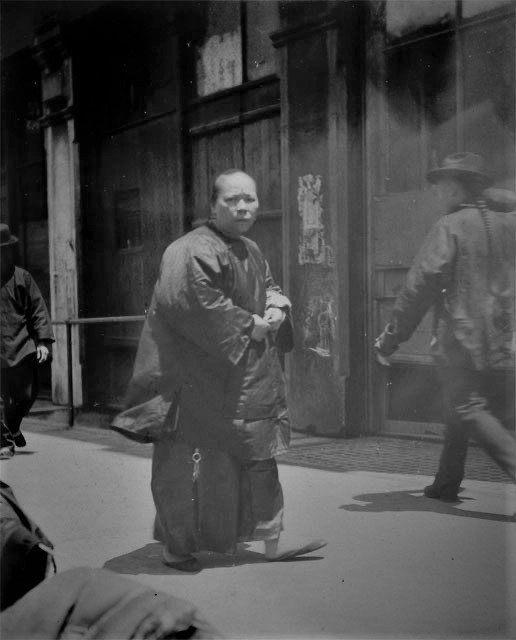
Woman walks in an alleyway of San Francisco Chinatown, no date. Photographer unknown.

Portrait of Chinese woman, no date. Photographer unknown.
[updated 2023-3-13]
#Chinese American pioneer women#Page Act of 1875#William Shew's Pioneeer Gallery#Chin K. Toy#L.H. Sun#Arnold Genthe#J.J. Reilly#Chinese Bagno#I.W. Taber#Iris Chang#San Francisco Chinatown women#mui tsai#Tye Leung Schulze#E.W. Baker#Allen's
4 notes
·
View notes
Note
heeseung really gives off teasing, playful soft dom vibes
he really does omg like the way his hands lightly trace your upper thighs and lower stomach, rubbing at the skin until you're whimpering underneath him, begging for him to touch you where you need him :(
and he's such a sucker for orgasm denial cuz he just loves the way you shake every time he pulls out right as you were getting to your high, or the way your words slur together to protest even tho you know he'll give it to you in the end cuz who is he to deny you of what you want?
33 notes
·
View notes
Video
youtube
Black women’s dance in the strip club reminds us that sexuality is a site of memory, as opposed to a history of violence and terror.
from Funk The Erotic by L.H Stallings
24 notes
·
View notes
Text
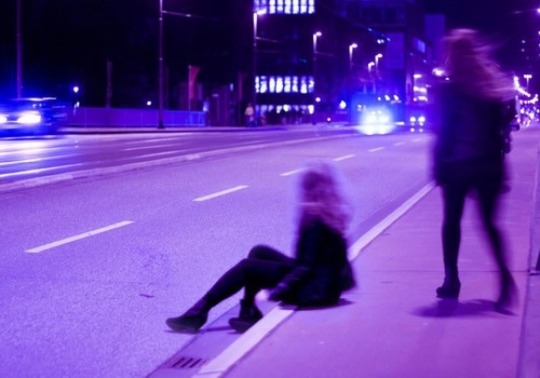
vulnerable l.h. - cologne
At a particularly loud clack, Luke looked over to Calum and Seph, who had been dominating the air hockey table. For a college town on a Friday, the bar wasn’t so busy, although that didn’t mean much, since most of the seats at the bar had been taken by groups of people hanging out. Luckily for them, the majority of their group was well over average height and wore varying levels of threatening expressions, so they’d had their respective games to themselves.
Luke leaned against the bar, keeping Calum and Seph’s drinks company, nursing his own. Michael, Ashton, and Priya had gone to play skee ball across the room with someone from one of Priya’s classes.
Priya hurried over, followed shortly by Ashton and Michael almost as soon as Calum and Seph had finished their fifth game. Calum won, again, as he had the past two rounds. Priya leaned over to whisper something to her roommate, which the latter agreed with, and the two girls were gone quickly.
“Where’re they going?” Calum asked, taking a sip of the soda Luke handed him. The group had considered trying to get actual drinks, but figured a college bar, no matter how old they looked, they were all going to get carded. Michael and Seph definitely would have, either way. They both looked nineteen and no older, and had even gotten ID’d at the entrance to the bar.
Michael shrugged, settling into a seat at the end of the bar, next to Luke. “Priya just said ‘girl stuff’.” He said, adding quotation marks with his fingers. “They’ll probably be a while.”
Suddenly finding themselves with nothing to talk about, the boys fell into an awkward silence, trading glances among themselves, taking sips of their respective drinks. Calum and Michael seemed oblivious to the strange tension that existed between the four of them, but Luke and Ashton weren’t.
“So, Ashton, how do you know Michael and Seph?” Calum asked, taking a long, awkward sip from his soda.
His attempt to break the silence fell flat when Ashton shoved off of the bar, brushing past Calum as he walked past. “I’m gonna go check on Seph.” He muttered right before he was out of earshot. Calum and Luke traded a glance, but the latter shrugged and returned to his drink.
Ashton and Priya returned, sharing a laugh over something Priya had on her phone, nearly tripping over one another as they made their way back to the bar. Seph followed shortly behind, seeming even more tired than she had been before, and Luke was keen to recognize the bags under her eyes. They didn’t seem very out of place, although he figured with how tired she had seemed in class most of the time, that they were.
“So, air hockey?” Calum asked, once Seph had taken a long sip of her drink. He nodded eagerly towards the table, leaning against the bar, almost directly between her and Ashton.
Seph offered the slightest of grins, rubbing her under eyes gently. “I would, but I think I just need to recuperate for a minute. Why don’t you play Ash? He taught me everything I know.” She suggested, seemingly ignoring the frantic glare her friend shot her from over Calum’s shoulder.
Spinning around to Ashton, Calum grinned and took the other boy by the shoulders, steering him towards the table, despite Ashton’s refusal. Michael and Priya agreed upon yet another round of skeeball, both making their way back to the machines. That left Luke and Seph, who hadn’t even acknowledged each other since dinner.
Luke didn’t even realize that Seph hadn’t gone with her brother until something pressed against the back of his shoulder. He turned slightly to find Seph, who had been facing away from him, so their backs were nearly pressing against one another’s, with her head tilted all the way back, leaning against his shoulder, apparently napping. With a chuckle, he readjusted, lifting her head and dropping it once so she rested against his arm, almost exactly the way she had earlier that day. Seph didn’t stir during the interaction until she was situated against Luke’s arm, sighing and nuzzling into it, clearly unaware of her actions.
The girl who leaned against Luke’s arm was gently snoring, one cheek pressed into the boy next to her, lifting her lip just enough to reveal white teeth. Her front teeth jutted out just slightly over her bottom teeth, despite the obvious signs she’d worn braces. Her nose was the same as her brother’s, save for the small white scar just below the bridge of her nose that contrasted with her tanned skin. For such a tired girl, and with the skin tone of her brother, Luke would have expected her to be much paler, but Seph was gorgeously sunkissed.
“Is she sleeping?” Ashton asked, unusually quiet, in the lull between games. He had crept over to sit next to Luke, who jumped at his question. “If you want, I can take her home.”
Luke turned to Ashton, trying not to disturb the slumbering figure on his other side. “It’s all good, not bothering me.” His arm was falling asleep, but no one needed to know that. “You can go back to your game.” He continued, waving his hand toward Calum, who was staring intently at the air hockey table.
With a cautious, nearly poisonous look, Ashton turned away, draining his soda and dropping the glass on the bar with a thud. He cast one more look over his shoulder to Luke, who had already turned away in favor of glancing at the girl who slept against him.
The pair at the bar looked surprisingly good together, although no one doubted that anyone in their group was attractive. Seph and Luke had one of the more dramatic height differences – although not as dramatic as the foot between Luke and Priya – but her head was the perfect height to press into his arm.
It wasn’t long before raised voices came from the air hockey table, but Luke didn’t very much care to listen in. Calum and Ashton had been butting heads all night, over some issue Ashton took up, but Calum seemed oblivious to his dislike. Luke figured the arguing was just them getting it out of their system.
“You knew we had to leave early.” Ashton was practically shouting as the pair walked past Luke and Seph. “I asked for the time.”
Calum was following shortly behind the other boy, sighing. “I told you the time. How is this my fault?”
Ashton snapped around, eyes narrowing both at Calum and the couple at the bar, the latter of whom he hadn’t noticed were still in the same position. “It just,” He waved his hands fervently. “Whatever, let’s go.”
“We’re going.” Ashton said, laying a hand on Seph’s shoulder as Michael handed his card to the bartender. “C’mon, Squish.”
Unlike earlier, Seph was quick to blink awake, blue eyes blinking open suddenly, just as quickly as she sat up and brought her hand to her cheek. Her cheeks were red, but just as she opened her mouth to apologize, Ashton yanked her off of the barstool by her wrist.
“Ash, what’s the matter?” She mumbled through a yawn, stumbling over her own feet as Ashton dragged her behind him, following Priya and Michael, who were rushing towards the bus stop. Bringing up the rear was Calum and Luke, speaking lowly to one another as they practically ran to catch up with the group.
Despite it being midnight, the downtown was alive with people, so much so that they were dodging others in their rush to the bus stop. At a particularly sharp turn around a highly populated beer garden, a large, rather drunk guy slammed straight into Seph, knocking her into Luke, where he quickly caught her by the shoulders. By the time both of them had shaken off the confusion, Ashton and Calum had disappeared around the building, and were nowhere to be found.
“Oh, fuck, I’m so sorry.” Another very drunk guy muttered, spilling himself and his beer over Seph as he followed a group of his friends. He didn’t even seem to notice the lack of beer in his cup as he raised it in a celebratory shout and followed his friends.
Unspeaking, Luke grabbed Seph’s hand, sweeping her under his arm to lead the pair away from the bar, and back towards where they had come from. The bus stop they had been heading for was lined with bars, likely to be surrounded by similar incidents that neither of them really wanted to deal with.
“Are you okay?” Luke asked, once they had safely found sanctuary next to a print shop, ducking down to inspect Seph’s shirt, doused in alcohol. “That guy barely even apologized.” He muttered, scowling at the mess.
Seph stifled a yawn, plucking at the shirt, although she seemed mostly nonplussed about the incident. “It’s f-” Her eyes finally met Luke, widening almost instantly. “Why are you taking your shirt off?”
With another scowl, Luke finished pulling off his jacket and tossed it to the girl, rolling his eyes. “Please, princess, this isn’t a peep show. It’s cold out.”
“It’s, like, seventy degrees.”
“Shut up and put the jacket on.”
She didn’t complain further, only obeyed, slipping the jacket over her shoulders and tightening the fabric around her waist. Seph wasn’t so small, but Luke’s shoulders were broad, so the jacket hung off of her in a way that had her shoving the sleeves up to reveal her hands. “What’re we gonna do? The next bus is in, like, forty minutes.”
Luke didn’t really have a plan when he pulled Seph away, but the bus was almost certainly gone, and there was little chance of their friends waiting for the blondes. “Walking, I guess.”
“Walking?” Seph echoed in a much smaller voice, peering up at Luke like he was crazy. “It’s a twenty minute walk through Greek row at midnight on a friday. I wouldn’t go through there even if I was your height and a hundred pounds heavier.” There had been multiple instances of her walking back through the neighborhood that laid between campus and downtown that ended with a punch and Michael bailing her out of trouble with a frat.
The boy said nothing for a moment, although he started towards the heavily tree-lined streets of the neighborhood just south of the buildings. “No need to worry, princess. No one fucks with me.”
True to his word, Seph’s normal encounters were nowhere in the realm of what they experienced. They were approached by the occasional drunken party-goer who recognized Luke, but he didn’t stray.
The moonlight made Luke’s eyes look grey, flashing as they met the streetlights. Seph could make out the smallest imperfection on the left side of his lower lip. It was a scar she was very familiar with, since she shared the same mark.
“Can I ask you something?” Seph asked, breaking the peaceful quiet the pair had fallen into. Her arms came around herself to quell the shiver that ran down her back. The sigh that followed seemed like permission to continue, so she did. “What’s with Princess? I have a name.”
Luke cracked the slightest of grins, lips curling to one side as he looked down at Seph. “What, you’re not into it?” He paused, catching Seph by the wrist just before she brushed past him, and spinning her to face him. “At least zip up the jacket.” He muttered, mostly to himself, as he zipped up the jacket.
“I didn’t say that.” The blonde girl muttered, cheeks reddening. She couldn’t quite figure Luke out, and was sure that was just the way he preferred it. Still, Seph enjoyed the company, and for the first time, she didn’t have the urge to start running when someone stumbled out of a house.
Seph wasn’t a violent person, but there was just something so punchable about a frat guy. And Luke.
She’d heard the name before. Hemmings was an infamous whisper amongst the dining halls, of whatever he and Hood had been doing the night before. Upperclassmen friends she made would warn her away from anyone with an H last name.
Despite her friend’s warnings, Seph couldn’t help the way her cheeks warmed when Luke glanced down at her with that grin. But she’d always been a proximity person, and she chalked the fluttering in the depths of her stomach up to the fragrant depth of Luke’s cologne that flooded her senses. It was mild, not too heavy, which she appreciated, and she hadn’t even noticed it until she was wearing his jacket.
His demeanor was entirely different to how he had been in class. It wasn’t that he was any less confident, but he kept his head down in class, and didn’t say much. He had friends, quite talkative ones, that he enjoyed the company of in class, people Seph didn’t like to associate with, but he wasn’t much for speaking. However, it was a stark difference to the confident way he greeted people and carried himself while they made their way down the pavement.
He fit right in on Greek row.
“So, what does-”
“Luke!”
Luke scowled at the interruption, spinning around to find the source of the exclamation, brow knitting when his eyes finally fall on the person. Under the streetlight that shadows his features, he can’t see the figure very well, but that problem is quickly solved by their emergence into the light.
This girl is gorgeous.
Long legs that seemed to go on forever in the skirt she wore, beautifully golden, compliment the blonde ends of her dark hair and white smile. “Lu, I didn’t realize you were around. You should’ve said hi.”
“Just passing by. This your party?” He nodded towards the house she had come from, alive with a loud party that would definitely fizzle out in a few hours after a noise complaint.
The girl’s cheeks seem to redden as she tucks a lock of hair behind her ear, tittering nervously. “Uh, yeah, not mine. Sneaky link, you know how it is.” The two shared a soft chuckle, apparently recalling their own, before the girl’s dark eyes fall to Seph, who couldn’t look more nervous. “You’re cute. I’m Mya.”
“Seph.”
“Oh, you know, when I was in high school, I had this freshman. Her name was something like Steph, but it wasn’t quite.” Mya exclaimed excitedly, turning her attention to Seph completely. “You know, Steph, you look a lot like her.”
“Seph.” Luke corrected, nudging Mya gently to hammer the point home. “Her name’s Seph.”
There was a beat of silence before Mya squealed and spun back to Seph. “Ohmygod, did you go to Rainer High in Toulouse?” Seph barely had the time to nod before Mya was pulling her into a bone-crushing hug. “Girl! It’s been too long.” She suddenly gasped and pulled back, holding the shorter girl at arm’s length. “Sephie, didn’t we tell you to never go home with the tall ones with pretty eyes? I know they’re cute, but it never goes well.” She leaned in, although she didn’t lower her voice, so Luke heard everything. “Believe me, this one definitely isn’t worth it.”
With an affronted look, Luke cocked his head to the side, scowling at his friend as he pulled her away by the back of the bralette she wore. “Alright, you. This has been nice, but I think Seph’s brother will kill me if we don’t head back soon.”
“Oh, right, you’re Michael Clifford’s sister, right?” Michael was much more known around the town than Seph was. She didn’t have the time to go to nearly as many parties as he did, but she definitely had him beat in the theater department. “And Ashton Irwin! They were always nice.” Mya paused, slinking after Luke as he started to walk away with Seph under his arm. “For boys. You know, Sephie, if you wanted a hookup, I know a lot nicer guys.”
“We’re not-”
“Mya, we’re not hooking up. I’m walking her home.”
Mya’s expression soured as she slipped off her heels to carry them, catching up with the blonde pair. Without heels, she was shorter, although she was still taller than Seph, albeit, not by much. “Like hell you are. Sephie, never let boys know where you live.”
Despite the way Luke glanced down in a silent question if Seph was done with Mya’s presence, Seph giggled at her old friend’s proclamations, filing each of them under the other advice she’d been given. “I’ll keep it in mind. Luke, I can go home from here.” She muttered, just as they approached the greenhouses on the edge of campus, poking Luke gently in the ribs, in case he hadn’t heard her.
“Like hell you are.” Luke said, glancing up at Mya, who giggled at his echo. “Do you realize how much Michael will hurt me if I let you walk home alone?”
“Luke, I’ll be fine, it’s a ten minute walk-”
“Plus she won’t be alone,”
“Yeah, exact- wait, what?”
Mya scoffed, as if the question was dumb in of itself, but she just as easily slung her arm around Seph’s shoulders, to drag her along. “You never let boys know where you live. You also never walk home alone. That’s what sisters are for.” She added with a jostle of Seph’s shoulders.
Rationally, Seph knew that she should call Ashton and have her meet him halfway, which would avoid the worst-case scenario of both options, but something told her to trust Mya. Maybe it was the way that she smelled the exact same as the entire cheer team used to, a group of some of the sweetest and best friends Seph had ever known. It might’ve been her infectious smile that made Seph want to grin instantly.
“Yeah, okay.” She admitted, sweeping a lock of soft blonde hair over her own shoulder. “Luke, I’ll see you in class?”
Apprehension was written across Luke’s face, but he nodded after brief hesitation. His blue eyes searched Seph’s for any second thoughts, but apparently finding none, he took a step away from the girls, running a hand through his loose curls. “Tomorrow. Do you have my phone number?”
“I’ll get it from Mikey.”
Still hesitant, Luke nodded, slowly, taking another step away. “My, text me when you drop her off and when you get home.”
“Goodbye, Lu.”
“Bye, Mya.” He lowered his gaze to Seph, waiting for her gentle nod to take another step away and spin around. “Tomorrow, Princess.”
Both Mya and Seph waited for Luke to lumber around the corner to turn back around and continue towards the dorms, not turning until they saw his tall figure disappear from the road it had been cast on.
“Okay, Seph. You have to fill me in on everything.”
Seph hadn’t realized she still wore Luke’s jacket until she burrowed into it and found a surprisingly pleasant whiff of the cologne she’d become a big fan of.
#5sos fanfic#5sos#luke hemmings x oc#luke hemmings fanfiction#luke hemmings fanfic#luke 5sos#lrh#5sos smut#mgc#afi#cth#y'all i am so sorry for not updating#i got so bored of vulnerable bc i wrote out all of the fun shit#and then was like#whatever#so i'm back#but idk how often bc I have shit i need to be doing#someone come yell at me to do homework and get off of tumblr#honestly it's writing that does me in#vulnerable l.h.#vulnerable
10 notes
·
View notes
Text
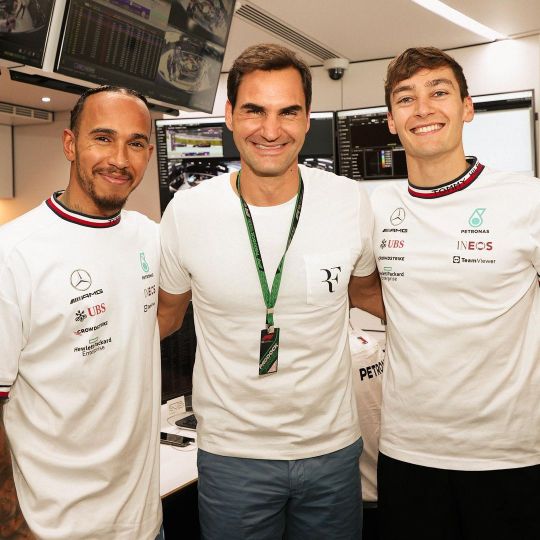
this is too precious
29 notes
·
View notes
Text
" So langsam verstehe ich, nicht ich bin falsch sondern die ganze Welt."
1 note
·
View note